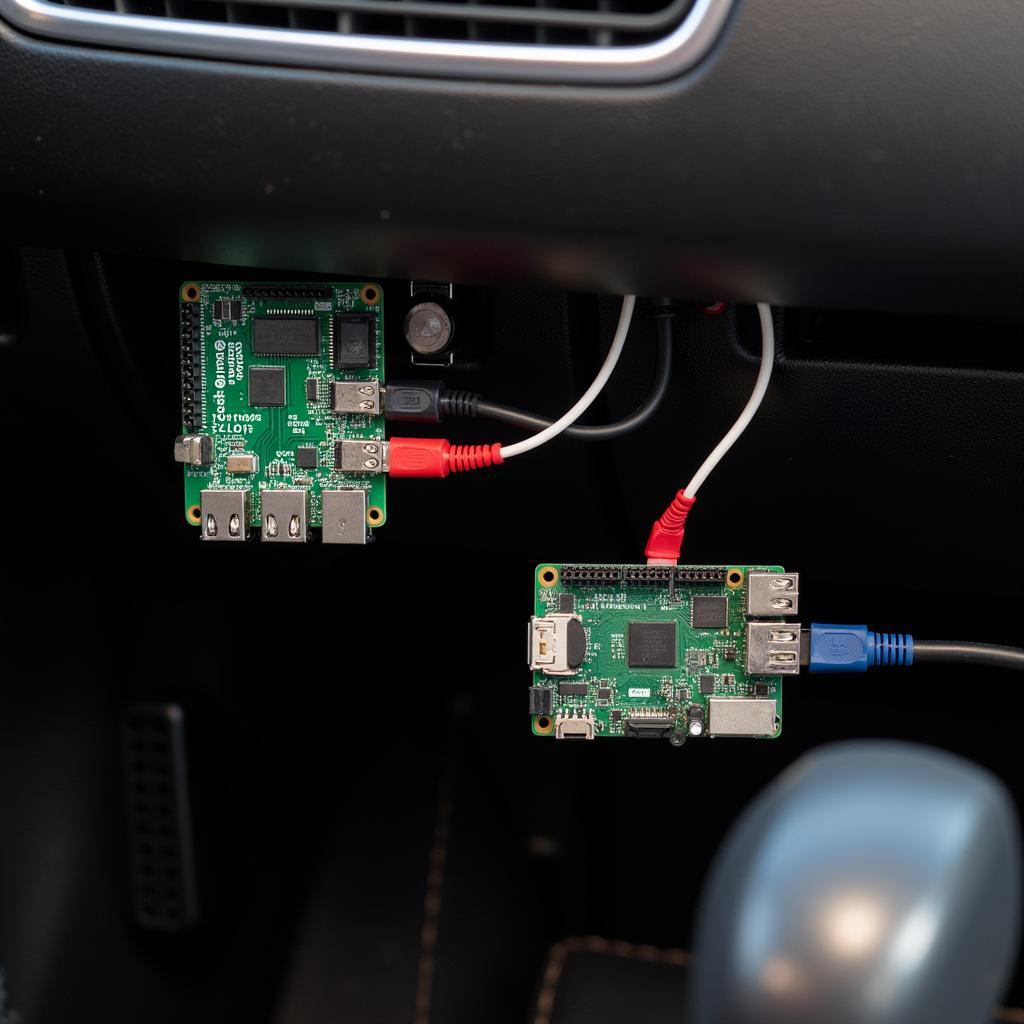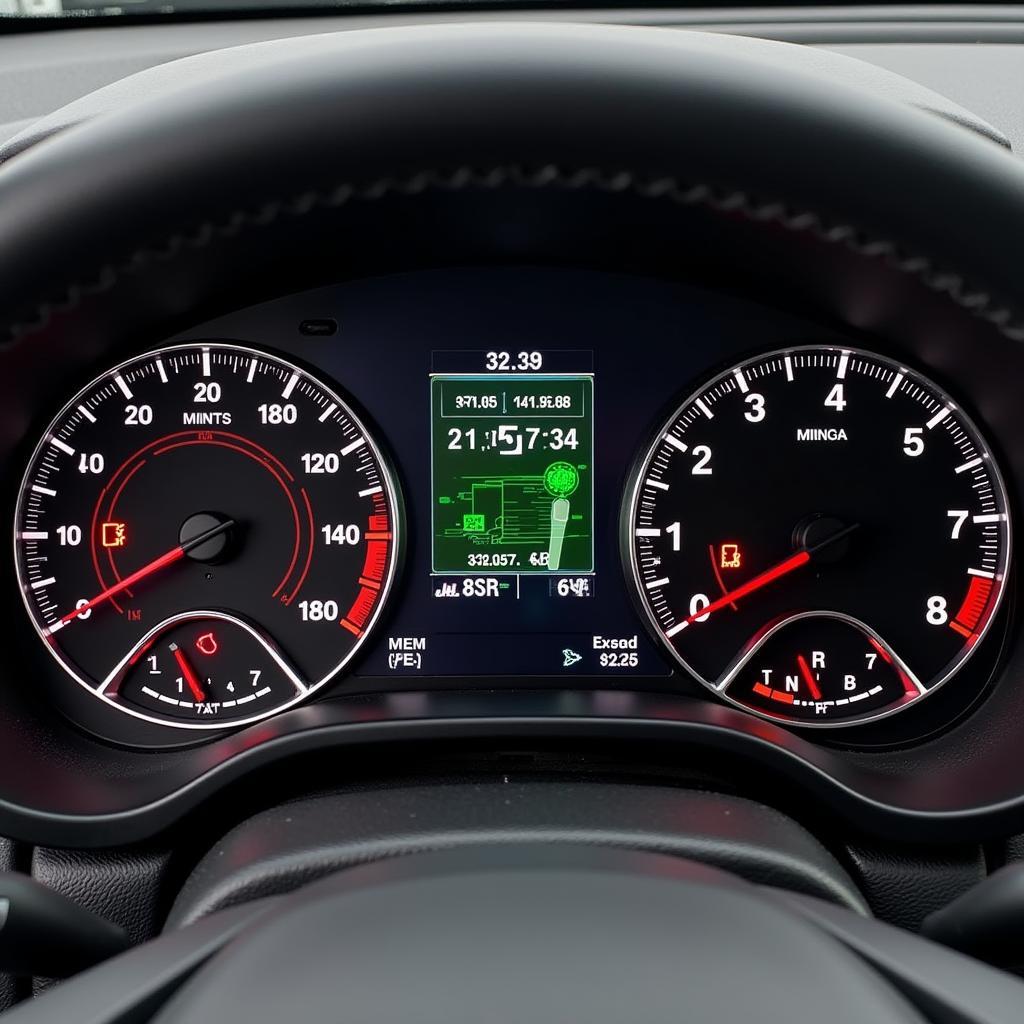Imagine this: your car starts acting up, throwing on that dreaded check engine light. You take it to the mechanic, only to face a hefty bill for a problem that seemed minor. Frustrating, right? Enter the world of Raspberry Pi Car Diagnostics, a game-changer for car enthusiasts and budget-conscious drivers alike.
No longer do you need to rely solely on expensive garage visits. With a Raspberry Pi – a credit card-sized computer – and some readily available components, you can unlock a powerful diagnostic tool right in your garage.
Unveiling the Power of Raspberry Pi for Car Diagnostics
But how does this tiny computer transform into a car whisperer? The magic lies in the Raspberry Pi’s versatility and the OBD-II port present in most modern vehicles (post-1996).
 Raspberry Pi Connected to Car’s OBD-II Port
Raspberry Pi Connected to Car’s OBD-II Port
The OBD-II port acts as your car’s data treasure chest, holding a wealth of information about your engine’s performance, emissions, and potential issues. By connecting the Raspberry Pi to this port, you gain access to this data, which can then be interpreted and displayed in an understandable format.
Advantages of Choosing Raspberry Pi for Your Car Diagnostic Needs
The benefits of embracing Raspberry Pi for car diagnostics extend far beyond just cost savings:
- Affordability: Compared to professional-grade diagnostic tools, a Raspberry Pi setup is significantly cheaper, making advanced diagnostics accessible to everyone.
- Customization: Tailor the system to your exact needs by selecting the software and features that align with your car and your diagnostic goals.
- Learning Experience: Delve into the world of car electronics and gain a deeper understanding of your vehicle’s inner workings.
- Community Support: A vast and active online community of Raspberry Pi and car enthusiasts offers a wealth of knowledge, resources, and support.
Building Your Own Raspberry Pi Car Diagnostic System: A Step-by-Step Guide
Ready to embark on your DIY car diagnostics journey? Here’s a simplified guide to get you started:
-
Gather Your Supplies: You’ll need a Raspberry Pi (Model 3 or 4 recommended), an OBD-II adapter compatible with Raspberry Pi, a reliable microSD card, a power supply for the Raspberry Pi, and a way to display the information (monitor, tablet, or even your smartphone).
-
Install the Operating System: Choose a Raspberry Pi OS compatible with diagnostic software. Popular options include Raspbian and Ubuntu.
-
Select Your Diagnostic Software: A variety of open-source and paid car diagnostic software options are available. Popular choices include Torque Pro, OBD Fusion, and OpenDiag.
-
Connect and Configure: Connect your Raspberry Pi to your car’s OBD-II port using the adapter. Configure the software according to your vehicle’s make, model, and year.
-
Start Diagnosing: Once set up, you can start reading and interpreting your car’s data, empowering you to diagnose issues, monitor performance, and stay ahead of potential problems.
Choosing the Right Software for Your Raspberry Pi Car Diagnostic Setup
Selecting the right software is crucial for an efficient and informative diagnostic experience. Here are some popular options:
-
Torque Pro: A widely used Android app offering real-time data monitoring, fault code reading and clearing, and customizable dashboards.
-
OBD Fusion: Available on both Android and iOS, OBD Fusion provides comprehensive diagnostics, including live data, graphing, and logging capabilities.
-
OpenDiag: This open-source option focuses on providing in-depth diagnostics for specific car manufacturers.
Taking Your Raspberry Pi Car Diagnostics Further
The beauty of the Raspberry Pi lies in its endless possibilities. Here are a few ways to enhance your setup:
-
Data Logging: Record and analyze data over time to track long-term performance and identify intermittent issues.
-
GPS Integration: Combine diagnostic data with location information for comprehensive trip tracking and analysis.
-
Remote Monitoring: Access your car’s diagnostics remotely, even when you’re not physically connected.
 Advanced Raspberry Pi Car Diagnostic Setup with Custom Dashboard
Advanced Raspberry Pi Car Diagnostic Setup with Custom Dashboard
Conclusion: Embracing the Future of DIY Car Maintenance
Raspberry Pi car diagnostics have emerged as a game-changer, empowering car owners with affordable, accessible, and insightful diagnostic capabilities. Whether you’re a seasoned mechanic or a car enthusiast looking to delve deeper into your vehicle’s inner workings, a Raspberry Pi-based system provides a powerful and rewarding solution. Start your journey into the world of DIY car diagnostics today and unlock a new level of car ownership.
FAQs
1. Do I need to be tech-savvy to use a Raspberry Pi for car diagnostics?
Not necessarily. While some basic computer skills are helpful, the setup process is well-documented, and the user-friendly software makes it accessible to even novice users.
2. Will using a Raspberry Pi void my car’s warranty?
Simply reading data from the OBD-II port should not void your warranty. However, it’s always best to consult your owner’s manual or contact your car manufacturer if you have any concerns.
3. Can I use a Raspberry Pi for coding and other projects when I’m not using it for car diagnostics?
Absolutely! The versatility of the Raspberry Pi allows you to use it for a wide range of projects, from home automation to media centers.
4. Where can I find support or resources for setting up my Raspberry Pi car diagnostic system?
The Raspberry Pi and car enthusiast communities are incredibly active online. Forums, blogs, and social media groups dedicated to Raspberry Pi and car diagnostics offer a wealth of information and support.
5. Is it legal to use a Raspberry Pi for car diagnostics?
Using a Raspberry Pi for personal car diagnostics is generally legal. However, laws and regulations may vary, so it’s always best to check with your local authorities if you have any concerns.
Need help with car diagnostics? Contact us on WhatsApp: +1(641)206-8880, Email: [email protected]. We are available 24/7 to assist you.

Leave a Reply